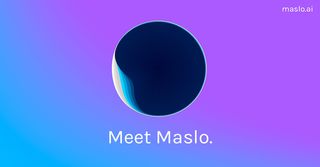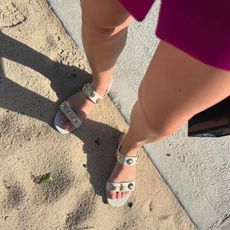I'd Never Been Able to Keep a Diary—Then I Started "Snap Journaling"


Self-care is a term that's infiltrated American culture with gusto over the past few years. The combination of a contentious political climate and increased mental health awareness has inspired folks to try new wellness habits from grown-up coloring to sound bathing. Personally, I'll admit that I'm skeptical of many of the self-care "trends" that have found a place within the saturated wellness marketplace (I don't know how much faith I have in the ability of a skin sticker to cure your anxiety, for example). But I do have a great deal of confidence in a few choice self-care habits, not least of which is daily journaling.
I've heard enough psychologists sing its praises and have spoken to enough habitual diary keepers to feel certain that putting your thoughts and feelings in writing at the end of each day can have major mental health benefits. As social worker Maud Purcell, LCSW, told PsychCentral.com, journaling is a tradition that dates back to at least 10th-century Japan and that some of history's most successful figures, from presidents to writers, have sworn by it. (As Oscar Wilde once said, "I never travel without my diary. One should always have something sensational to read on the train.") According to Purcell, journaling can help you clarify your thoughts and feelings, know yourself better, reduce stress, and resolve disagreements with others. There is truly no downside to the practice.
And yet… I have never been able to make a habit out of it. Every time I've caught a bout of inspiration and resolved to start writing in a journal regularly, the routine has lasted about three days. It might be because the last thing I want to do at the end of a day of writing for work is write more, or it might be just because journaling with a pen and paper feels too formal and awkward. Either way, I've never been able to stick with it.
A few months ago, however, I met a Los Angeles–based software engineer named Matt Schwarz, who helped launch an app this past March aimed at turning millennial non-journalers like me onto keeping a diary once and for all. The free app is called Maslo, and it features a delightfully simple AI robot—a "digital companion," it's called—that invites users to record voice journal entries up to 60 seconds in length at a time. The app listens to whatever you had to share, and about a minute later, it spits out a word cloud based on your entry, displaying linguistic patterns that reflect where your feelings were in the moment, as well as an emoji representing its interpretation of your emotional state.
You can record whatever you like, from long, aimless rants to small observations—no entry is too minimal. If you get stuck on what to talk about, you can even choose to answer some of Maslo's preset prompts such as "What type of pizza would you be?" and "Tell me about the things that slow you down." Schwarz has labeled the practice "snap journaling," and though it's not as traditional as a pen and paper, that's what I love most about it: It makes journaling as quick and accessible as every other technology-focused activity in my life but offers the same sort of venue for self-reflection and emotional management.
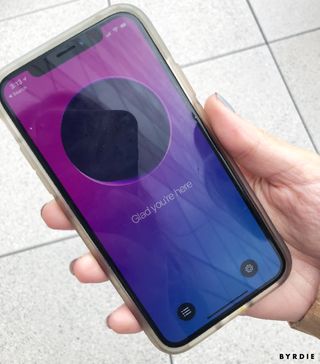
Maslo was created by former Googlers Cristina Poindexter and Ross Ingram as a way to marry self-care and technology for millennials. "By showcasing how technology can assist with a person's overall well-being and become a true companion, Maslo is separating itself from being just another 'digital assistant,' but rather an entity you want to interact with because you are building a relationship," Schwarz (a member of Malso's founding team) explains. He hopes the app will help combat some of the widespread fear of artificial intelligence that exists in our culture. "The truth is that there are so many technologically based resources out there that can actually help people from a mental and/or emotional point of view," he says.
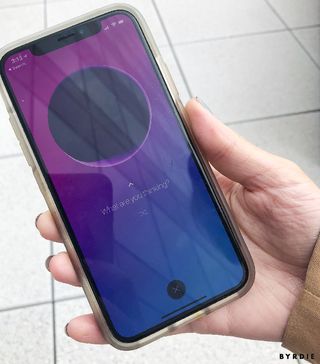
Schwarz personally relates to the inability to stick to journaling as an adult. "When I was younger, I used to keep a written journal, but as I got older, I found less and less time to do this," he told me. "At the end of the day, it was a good way for me to get thoughts out of my brain, but it wasn't something I could revisit, nor could I really track how it helped me grow as a person."
Some mental health experts agree that voice journaling can have benefits beyond those of traditional, written diaries. "Journaling is a beneficial self-care practice. A 'one step greater' beneficial practice is voice journaling on your phone or into a tape recorder," comments Fran Walfish, Beverly Hills family and relationship psychotherapist and author of The Self-Aware Parent. By Walfish's account, "Hearing your own voice verbalize problems and issues forces one to acknowledge their own shortcomings much better than hearing it from someone else." A recorded voice memo can help offer users perspective.
Other psychologists agree that while oral journaling can help reduce activity in the amygdala, the brain’s emotion center, and engage the thinking brain, which can make negative emotions less intense, there can be drawbacks compared to written journaling. "We are less distracted when writing, and are more likely to be distracted by the things in our environment when recording short oral messages," comments Emily Roberts, a psychotherapist and author of Express Yourself: A Teen Girls Guide to Speaking up and Being Who You Are. "Writing engages our minds to look for a solution or a way to feel better, rather than just speaking which does not." To get the most out of your verbal journaling experience, Roberts suggests the following steps:
1. Express what the thought is that is interfering with your mood.
2. Validate why you are feeling this way.
3. Ask yourself was isn’t true about your feelings or what your missing / leaving out.
4. Look at the facts and try to come up with a new thought based on what you observed.
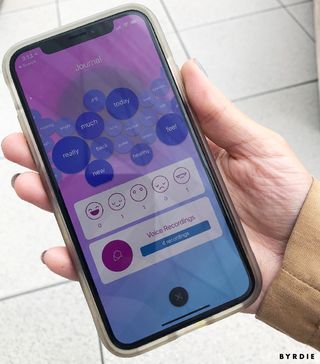
Since the launch of the app, Schwarz and his team have acquired a myriad of positive feedback from users, who've been enjoying the ease and personability of snap journaling with Maslo. "If you're having a particularly tough day, it's nice to be able to simply speak to Maslo like you would a person and share your experience in the moment while it's fresh, also knowing that it's going to be easy to find this entry later if you want to revisit it," he says. "From overall sentiment to people, places, and things you've mentioned, you start to notice patterns in yourself. … In this way, Maslo has turned 'snap journaling' into more than just a familiar social media–type action, but a way to convert your effort in personal reflection into something worthwhile to you."
Next up: Don't miss five things to remember if you want to start journaling.
Disclaimer
This article is provided for informational purposes only and is not intended to be used in the place of advice of your physician or other medical professionals. You should always consult with your doctor or healthcare provider first with any health-related questions.

Tie among Linda Rodin, Hari Nef, and David Bowie.
Who are your 5 favorite people to follow on Instagram?@petracollins @katiejanehughes @alwaysjudging @bonnyrebecca @hotdudesreading
What's the beauty essential you can’t live without?If I have some brow gel and Sisley's Phyto-Lip Twist, I'm good to go forever.
What's your desert island album?Death Cab for Cutie's Transatlanticism
What's your favorite Byrdie.com story?Game of Thrones's Nathalie Emmanuel looks so achingly beautiful in our feature with her that I think it's gonna have to be that!
